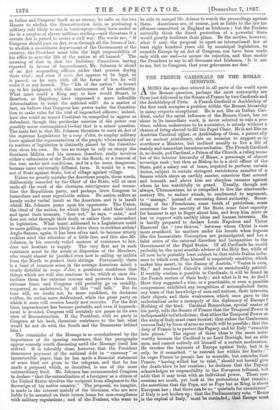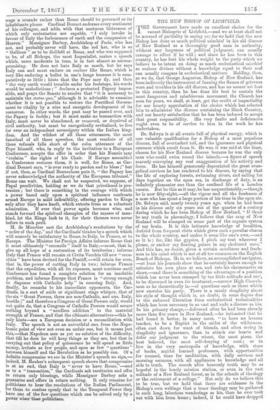THE FRENCH CARDINALS ON THE ROMAN QUESTION.
AMONG the speeches uttered in all parts of the world upon- the Roman question, perhaps the most noteworthy are- those just delivered in the Senate of France by two Cardinals and the Archbishop of Paris. A French Cardinal or Archbishop of the first rank occupies a position within the Roman hierarchy' in many respects exceptional. He is not, like an Italian Car- dinal, under the social influence of the Roman Court, has no. share in its immediate work, is never selected to rule a pro- vince, seldom endeavours to be a minister, is utterly without a chance of being elected to fill the Papal Chair. He is not like an Austrian Cardinal either, or Archbishop of Gran, a potent ally' of an ancient aristocracy, able on occasion to support or to- overthrow a Minister, but inclined usually to live a life of stately and somewhat luxurious seclusion. The French CardinaL is, no doubt, rid Cardinal, a Prince of the Church, a ruling mem- ber of the interior hierarchy of Rome, a personage of almost sovereign rank ; but then as Bishop he is a civil officer of the- State, paid a salary out of taxes, required to perform certain, duties, subject to certain stringent restrictions, member of a. Senatewhich obeys an earthly master, conscious that around and beneath and above him are sleepless enemies against whom he has watchfully to guard. Usually, though not always, 1J1tramentane, he is compelled to live the nineteenth-- century life, to endure attack, to condescend to argument„ to "manage," instead of exercising direct authority. Some-- thing of the Frenchman, some touch of patriotism, some- reverence for the sanctity of the State, some faint capacity for humour is apt to linger about him, and keep him more or- less en rapport with earthly ideas and human interests. He- is hardly prepared to declare Louis Napoleon and Victor- Emanuel the "two thieves," between whom Christ is once• more crucificed, he mutters under his breath when dogmas. like the Immaculate Conception are promulgated, and has a faint scorn of the external disorders and incapacities in the Government of the Papal States. Of all Cardinals he would probably be the most sensible adviser of the Holy See, while of all men he is probably least subject to that subtle Italian influ- ence to which even Pius himself is exquisitely sensitive, which makes him assert, to the dismay of Austria, "Venice. is ours,. Sir," and rendered Cairoli's rebuke so unendurably painfuL If worldly wisdom is possible to Cardinals, it will be found in the French section of their body ; and what is it we do find I Have they suggested a wise, or a practicable, or even a possible. compromise, exhibited any recognition of accomplished facts, any trace of that knowledge of men and nations, their interests,. their objects, and their weaknesses, which once gave to the ecclesiastical order a monopoly of the diplomacy of Europe ? Nothing of the kind. Cardinal Bonnechose, special orator of his party, tells the Senate of France that the Temporal Power is. indispensable to Catholicism; that either the Temporal Power or the unity of Italy must cease to exist; that unless the Conference- coerces Italy by force of arms no result will be possible; that the duty of France is to protect the Papacy, and let Italy "crumble- into pieces." The rigour of these ideas is the more note-- worthy because the Cardinal is no Lord Denbigh, but an able. man, and cannot entirely rid himself of a certain moderation. He invokes the bayonets of Europe against Italy, but it ia only, be it remarked, "to restrain her within her limits ; he urges France to permit her to crumble, but concedes that France, "having willed her to exist," should not herself give the death-blow to her creation ; he declares that the Papacy acknowledges no responsibility to the European tribunal, but that it may treat with an individual power. Those con- cessions are much, yet look at the pretensions that remain ; the assertions that the Pope, not as Pope but as King, is above European law ; that there can be no "quietude for consciences" if Italy is not broken up ; that the Parliamentary vote, "Rome is the capital of Italy, must be rescinded ; that Europe must wage a crusade rather than Rome should be governed as its inhabitants please. Cardinal Donnet endorses every sentiment of his colleague, and adds, with that unctuous bitterness of which only ecclesiastics are capable, "I only invoke in favour of Italy the forbearance of earth and the compassion of Heaven." Monsignor Darboy, Archbishop of Paris, who has not, and probably never will have, the red hat, who is so Gallican " as to be dislikdd at Rome, and who was supposed to be, of all Bishops, the most Imperialist, makes a speech which, more moderate in tone, is in fact almost as uncom- promising. He does not hate Italy so much, but he says Italy can and must endure an enclave like Rome, which is very like enduring a bullet in one's lungs because it is com- paratively so little ; hints that the Pope may fly, and then "the very earth would tremble under his footsteps, his words would be Maledictions ; " declares a protected Papacy impos- sible, and prays the Senate to resolve that "it is necessary to maintain the status quo," although it is advisable to examine whether it is not possible to restore the Pontifical Govern- ment to vitality by a wise and energetic development of its resources. In other words, the past may be passed over, and the Papacy is feeble ; but it must make no transaction with Italy, must never be abandoned, or removed, or deprived of civil authority, but must be energetically revitalized, to live for ever an independent sovereignty within the Italian king- dom. And the wildest of all these utterances, the most fanatical of all these speeches, the most resolute of all these refusals falls short of the calm utterance of the Pope himself, who, in reply to the invitation to a European Conference, accepts the offer in order that his Nuncio may "reclaim" the rights of his Chair. If Europe assembled in Conference restores them, it is well, for Rome, as Car- dinal Donnet says, "is ever ready to pardon and to bless ;" but if not, then, as Cardinal Bonnechose puts it, "the Papacy has never acknowledged the authority of the European tribunal." Rome can wait. We shall not be suspected, we suppose, of Papal proclivities, holding as we do that priesthood is pre- tension; but there is something in the courage with which a power based only upon a spiritual influence confronts armed Europe in mild inflexibility, offering pardon to Kings only after they have knelt, which extorts from us a reluctant admiration. If ever that power again becomes wise, and stands forward the spiritual champion of the masses of man- kind, let the Kings look to it, for their thrones were never before in such peril.
M. de Moustier met the Archbishop's resolutions by the "order of the day," and the Cardinals' tirades bya speech which will scarcely be satisfactory to Rome, to Italy, to France, or to Europe. The Minister for Foreign Affairs informs Rome that it must ultimately "reconcile" itself to Italy,—must, that is, give up all hope of a restoration of its territories ; informs Italy that France will remain at Civita Vecchia till new " secu- rities " have been devised for the Pontiff,—will retain for ever, that is, the power of cutting Italy in two ; informs France that the expedition, with all its expenses, must continue until Conference has found a complete solution for an insoluble problem, and informs Europe that France is "strong enough to dispense with Catholic help" in coercing Italy. And, finally, he remarks to his immediate opponents, the Car- dinals, in a sort of aside or significant stage whisper, that of the six "Great Powers, three are non-Catholic, and one, Italy, hostile ;" and therefore a Congress of Great Powers only, would not quite do, that a Congress of Catholic Powers would secure nothing beyond a "needless addition" to the material strength of France, and that the ultimate alternatives—this he only hints—are a European decision or a reconciliation with Italy. The speech is not an untruthful one, from the Napo- leonic point of view not even an unfair one, but it means just this,—that Napoleon sees as yet no solution of the difficulty, that till he does he will keep things as they are, but that in carrying out that policy of quiescence he will spend as little money, irritate as few people, and open as few " questions " between himself and the Revolution as he possibly can. Of a definite compromise we see in the Minister's speech no sign,— indeed, M. Bouher's subsequent speech shows that compromise is at an end, that Italy is "never to have Rome,"—and as to a "transaction," the Cardinals ask territories and offer in return only blessings, while Monsignor Darboy asks a guarantee and offers in return nothing. It only remains for politicians to hear the resolutions of the Italian Parliament, for them to confess openly that in the Temporal Power they have one of the few questions which can be solved only by a power wiser than politicians.



































 Previous page
Previous page